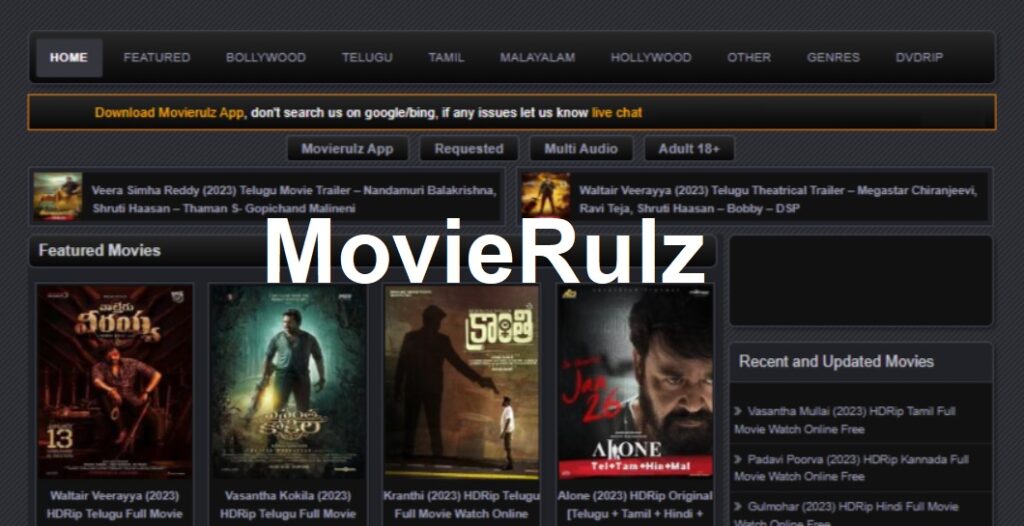Movierulz: Latest Movies & News - What You Need To Know
Is the allure of instant access to the latest cinematic releases too tempting to resist, even when it treads on ethically questionable ground? The persistent presence of platforms like Movierulz, a website notorious for distributing pirated movies, underscores a complex interplay between consumer demand, the entertainment industry, and the legal ramifications of copyright infringement.
The digital age has revolutionized how we consume entertainment. Streaming services offer vast libraries of content at our fingertips, cinemas continue to draw audiences, and the accessibility of the internet has fostered a global community of film enthusiasts. However, this convenience has also created fertile ground for piracy, with websites like Movierulz capitalizing on the desire for free and immediate access to movies.
Movierulz, a recurring name in the realm of online piracy, operates on a model that directly undermines the legitimate movie industry. It provides access to pirated versions of movies, including recent releases from Bollywood, Tollywood, Hollywood, and regional Indian cinema. This includes films in Hindi, Tamil, Telugu, Kannada, Malayalam, and English, among other languages. By offering these movies for free download, Movierulz circumvents copyright laws and denies revenue to the creators, distributors, and all those involved in the production of the films. The website's tactics involve uploading pirated versions of movies, often shortly after their theatrical release or digital premiere, thereby appealing to a wide audience seeking to watch movies without paying.
While the website's existence raises ethical concerns, it is important to understand the implications it has on the entertainment industry. The availability of pirated content undermines the financial viability of filmmakers, actors, and other professionals whose livelihoods depend on the success of their films. Beyond financial losses, piracy also discourages investment in future projects, as it becomes more difficult for studios to recoup production costs and generate profits. In essence, it stifles creativity and innovation, which are the building blocks of a thriving entertainment ecosystem.
The site operates within a landscape defined by ongoing legal battles and efforts to curb online piracy. Governments and industry groups work to shut down illegal streaming websites and prosecute those involved in distributing copyrighted material. The evolution of technology has also provided new ways to combat piracy, as streaming services and content creators deploy digital watermarks and other safeguards to protect their assets. There are also legal streaming services available like Zee5, offering a vast library of movies in high-definition, including the latest releases, with official licensing and complete legal compliance.
Beyond the core function of distributing pirated movies, websites like Movierulz often attempt to broaden their scope by providing additional content. This frequently includes movie reviews, news about upcoming releases, trailers, and updates related to the entertainment industry. They may also cover news related to television shows and streaming platforms, further incentivizing user engagement. However, this content is usually secondary to the main attraction: the pirated movies. The website's interface may also be set up to facilitate easy navigation and the possibility to download movies in different qualities like 480p, 720p, and 1080p, as a further effort to attract a wider audience.
The website's structure typically includes sections for different film genres, languages, and release years. This organization assists users in finding the movies they are looking for quickly. The websites often use advertising revenue as a primary income source, which means users are often exposed to various pop-ups, redirects, and other intrusive elements. Some sites might even offer paid subscriptions that provide faster download speeds or access to exclusive content, despite the illegal nature of the operations.
The ease of access to these materials raises questions on user behavior. While the appeal of free entertainment is undeniable, it's important to consider the ramifications of supporting illegal websites. From the perspective of media consumption, many consumers are unaware of the consequences of piracy, failing to understand the harmful repercussions that illegal downloads have on the entertainment industry.
Moreover, the legal consequences for engaging in copyright infringement should not be underestimated. Depending on the jurisdiction, users who download or share copyrighted material can face significant penalties, including hefty fines and even criminal charges. The legal environment is constantly changing, making the use of such websites a risky endeavor. Additionally, these platforms frequently contain malware and other dangerous software that can be malicious for devices and users information.
It is important to explore legitimate, legal options for viewing and streaming movies. Streaming services like Zee5, Netflix, Amazon Prime Video, and others offer a wide range of movies and TV shows and also allow users to watch content from different languages, ensuring the support of the film industry without the risk of legal issues.
The proliferation of websites like Movierulz represents a persistent challenge for the entertainment industry and raises serious concerns about copyright protection, the legal consequences of piracy, and the ethical considerations of consuming pirated content. It's important for consumers to be aware of the risks associated with such platforms and make informed decisions about how they consume media. By choosing legal and ethical alternatives, we can contribute to a sustainable entertainment ecosystem that supports creators, protects intellectual property, and promotes the continued production of quality films.
The concept of Movierulz also touches upon the ongoing evolution of technology and its impact on the distribution and consumption of media. As new technologies emerge, platforms like Movierulz adjust their strategies to circumvent protective measures and maintain their operations. This creates a continuous cycle of cat and mouse between illegal websites and those attempting to enforce copyright regulations and protect intellectual property.
The core of the issue remains the demand for content. People want access to films quickly and easily, and the providers are often very aggressive in fulfilling this need. This places pressure on the legal streaming platforms and the film industry to make content available at competitive prices and provide user-friendly experiences. The balance between accessibility, cost, and legal requirements defines the ongoing struggle against online piracy and the need for ethical consumption.
The case of Movierulz serves as a clear reminder of the complex challenges facing the media industry and the need for an ongoing dialogue around copyright, intellectual property, and the ethical considerations of media consumption. While the allure of free content may be tempting, it's crucial to consider the far-reaching implications and choose legal and ethical alternatives that support the entertainment industry and uphold the rule of law.
The popularity of websites like Movierulz also highlights the need for improved media literacy among the general public. Education about copyright laws, the ethical implications of piracy, and the benefits of supporting content creators through legitimate channels can help reduce the demand for pirated material. This should also be accompanied by a greater understanding of how these practices affect the livelihoods of those who make movies and other forms of entertainment.
It's important to note that Movierulz is not alone; it is part of a larger ecosystem of websites involved in movie piracy. Some of these sites may be more sophisticated in their operation, using virtual private networks (VPNs), proxy servers, and other techniques to make it more challenging to trace the source of their content and evade legal action. Others may take advantage of vulnerabilities in the online advertising ecosystem to generate revenue.
This widespread availability of pirated content underlines the importance of finding creative solutions to deal with the problem. In addition to increasing legal enforcement, the industry should focus on creating more attractive and convenient methods for people to get access to content legally. This might involve providing more flexible subscription models, making movies available sooner after their theatrical release, and enhancing the user experience.
In addition to movie piracy, there is also concern over other forms of illegal activity. One such activity is the illegal distribution of television shows, where viewers are able to stream episodes of TV series on a variety of websites for free. Another is the illegal distribution of software.
A variety of factors can be tied to the popularity of sites like Movierulz, including user demand for quick and cheap access to entertainment content. This often stems from the convenience that illegal platforms provide. It's easier than ever to download a movie, and the temptation of not having to pay for a movie is attractive.
There's a clear connection between the availability of pirated material and the financial losses experienced by the entertainment industry. The financial losses have a chain reaction, affecting everything from the ability of film companies to invest in future projects to the jobs of those working in the industry.
Despite the measures to deter illegal actions, sites like Movierulz are still in use. This illustrates the urgent need for continued effort to educate consumers about the harmful effects of piracy, encourage the use of legitimate alternatives, and improve the legal infrastructure for copyright protection. In the digital age, the challenges will always be present, but by coming together, the public can help support a sustainable and thriving entertainment industry.
The question of how to successfully combat movie piracy is a complex one, one that the entertainment industry, the legal system, and consumers must continue to address. It is a complex, ongoing battle, and the choices we make as viewers will have an impact on the future of film and television.


